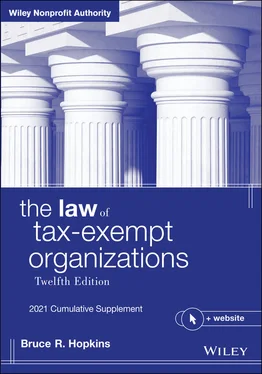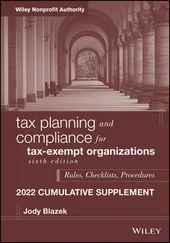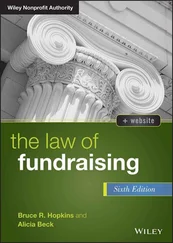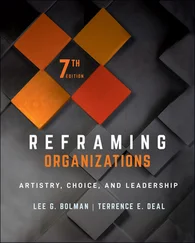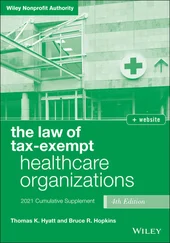Bruce R. Hopkins - The Law of Tax-Exempt Organizations, 2021 Cumulative Supplement
Здесь есть возможность читать онлайн «Bruce R. Hopkins - The Law of Tax-Exempt Organizations, 2021 Cumulative Supplement» — ознакомительный отрывок электронной книги совершенно бесплатно, а после прочтения отрывка купить полную версию. В некоторых случаях можно слушать аудио, скачать через торрент в формате fb2 и присутствует краткое содержание. Жанр: unrecognised, на английском языке. Описание произведения, (предисловие) а так же отзывы посетителей доступны на портале библиотеки ЛибКат.
- Название:The Law of Tax-Exempt Organizations, 2021 Cumulative Supplement
- Автор:
- Жанр:
- Год:неизвестен
- ISBN:нет данных
- Рейтинг книги:5 / 5. Голосов: 1
-
Избранное:Добавить в избранное
- Отзывы:
-
Ваша оценка:
- 100
- 1
- 2
- 3
- 4
- 5
The Law of Tax-Exempt Organizations, 2021 Cumulative Supplement: краткое содержание, описание и аннотация
Предлагаем к чтению аннотацию, описание, краткое содержание или предисловие (зависит от того, что написал сам автор книги «The Law of Tax-Exempt Organizations, 2021 Cumulative Supplement»). Если вы не нашли необходимую информацию о книге — напишите в комментариях, мы постараемся отыскать её.
The Law of Tax-Exempt Organizations, 2021 Cumulative Supplement — читать онлайн ознакомительный отрывок
Ниже представлен текст книги, разбитый по страницам. Система сохранения места последней прочитанной страницы, позволяет с удобством читать онлайн бесплатно книгу «The Law of Tax-Exempt Organizations, 2021 Cumulative Supplement», без необходимости каждый раз заново искать на чём Вы остановились. Поставьте закладку, и сможете в любой момент перейти на страницу, на которой закончили чтение.
Интервал:
Закладка:
2 17.1 In general, Hopkins, Legal Responsibilities of Nonprofit Boards, Third Ed. (BoardSource, Washington, D.C.: 2019).
3 89.1 Priv. Ltr. Rul. 202010025.
CHAPTER SIX Concept of Charitable
§ 6.2 Public Policy Doctrine(b) Race‐Based Discrimination
§ 6.3 Collateral Concepts(a) Requirement of Charitable Class (i) Illegal Activities
§ 6.2 PUBLIC POLICY DOCTRINE
(b) Race‐Based Discrimination
p. 118, third paragraph, fourth sentence. Delete and substitute:
This policy must be publicized by the school to all segments of the general community served by the school, by notice in a newspaper, use of broadcast media, or (pursuant to guidelines issued in 2019) 69.1 display of a notice on its primary publicly accessible Internet homepage in a manner reasonably expected to be noticed by visitors to the homepage.
p. 119, fourth line. Move footnote to follow guidelines.
p. 119, note 72. Insert before last period:
, as modified by Rev. Proc. 2019‐22, 2019‐22 I.R.B. 1260.
§ 6.3 COLLATERAL CONCEPTS
(a) Requirement of Charitable Class
p. 126, last complete paragraph. Insert as last sentence:
Yet, somewhat inexplicably, the IRS ruled that a resident advisory council with respect to a retirement community must have its tax exemption revoked because it is operating for the private interests of its members, portrayed as a “private class of residents,” and not functioning in ways that are “beneficial to the general public as a whole.” 143.1
(i) Illegal Activities
p. 135, note 213. Insert following existing text:
The IRS determined that an organization could not be exempt because it engaged in illegal activities, which apparently were activities to obstruct administration of the revenue laws, as detailed in a plea agreement entered into by its executive director (Priv. Ltr. Rul. 201924018).
p. 135, last paragraph. Insert as last sentences:
The IRS thus denied recognition of exemption in a case involving an organization that had as its mission provision of a way for its members to collectively and cooperatively cultivate and distribute marijuana for medical purposes to qualified patients and primary caregivers who came together to cultivate physician‐recommended marijuana. 217.1 The IRS adopted a similar stance in denying recognition of exemption to a nonprofit organization providing financial assistance to patients in need who are adversely affected by the costs of medical treatments using cannabis‐based compounds 217.2 and to a nonprofit organization with a program of fundraising and dissemination of funds to patients in a state program who had been approved to receive medical marijuana in the state. 217.3
Notes
1 69.1 Rev. Proc. 2019‐22, 2019‐22 I.R.B. 1260.
2 143.1 Priv. Ltr. Rul. 201911016.
3 217.1 Priv. Ltr. Rul. 201615018.
4 217.2 Priv. Ltr. Rul. 201917008.
5 217.3 Priv. Ltr. Rul. 201940008. See § 25.5(c).
CHAPTER SEVEN Charitable Organizations
§ 7.2 Relief of Distressed(b) Disaster Relief Programs
§ 7.4 Provision of Housing
§ 7.6 Promotion of Health(a) Hospital Law in General (b) Additional Statutory Requirements for Hospitals
§ 7.8 Advancement of Education
§ 7.14 Fundraising Organizations(c) Other Exemption Issues
§ 7.15 Instrumentalities of Government
§ 7.17 Qualified Opportunity Zones
§ 7.2 RELIEF OF DISTRESSED
(b) Disaster Relief Programs
p. 143, note 37. Delete 20.12 and insert 20.13.
p. 143, note 42. Delete text and insert:
Victims of Terrorism Tax Relief Act of 2001, Pub. L. No. 107‐134, 107th Cong., 1st Sess. (2001), enacting (§ 111(a)), inter alia , an exclusion from gross income for qualified disaster relief payments (IRC § 139(a)). The President, on March 13, 2020, declared the COVID‐19 pandemic a national emergency under the Robert T. Stafford Disaster Relief and Emergency Assistance Act, thereby triggering application of the federal tax disaster relief law, enabling employers to provide financial assistance to employees and their family members by means of charitable organizations.
pp. 143 and 144. Delete last paragraph on p. 143, carryover paragraph on p. 144, and two complete paragraphs on page 144, including footnotes, and insert:
The IRS returned to this matter of disaster relief programs provided by tax‐exempt charitable organizations by means of a publication issued in 2005 and revised in 2014. 44 This guidance recognizes that exempt charitable organizations can serve disaster victims and those facing emergency hardship needs by providing assistance to individuals and businesses.
(i) General Guidance.At the outset, the IRS observes that these charitable organizations must demonstrate that they serve a public rather than a private interest and assist a charitable class. The agency acknowledges that, in the past, employer‐sponsored organizations were considered by it to “enhance employee recruitment and retention, resulting in private benefit to sponsoring employers,” and there were “concerns that employers could exercise undue influence over the selection of recipients.” It recognizes, however, that after the September 11 attacks, “Congress took the position that employer‐sponsored private foundations should be able to provide assistance to employees in certain situations.”
According to this publication, charitable organizations may provide assistance to individuals in this regard in the form of funds, services, or goods to ensure that victims have the basic necessities, such as food, clothing, housing (including repairs), transportation, and medical assistance (including psychological counseling). The type of aid that is appropriate is dependent on each individual's needs and resources. The assistance may be for the short term, such as food, clothing, and shelter, but not for the long term if an individual has adequate financial resources. The publication states that individuals who are “financially needy or otherwise distressed are appropriate recipients of charity.” Examples given are of individuals who are temporarily in need of food or shelter when stranded, injured, or lost because of a disaster; temporarily unable to be self‐sufficient as a result of a sudden and severe personal or family crisis, such as victims of violent crimes or physical abuse; in need of long‐term assistance with housing, childcare, or educational expenses because of a disaster; and in need of counseling because of trauma experienced as a result of a disaster or a violent crime. 45
Disaster assistance may be provided to businesses to achieve these charitable purposes: aid individual business owners who are financially needy or otherwise distressed, combat community deterioration, 46 and lessen the burdens of government. 47 A tax‐exempt charitable organization can accomplish a charitable purpose by providing disaster assistance to a business if the assistance is a “reasonable means” of accomplishing a charitable purpose and any “benefit to a private interest” is incidental to the accomplishment of a charitable purpose.
The IRS guidelines invoke a needy or distressed test. They state that, generally, a disaster relief or emergency hardship organization must make a “specific assessment” that a potential recipient of aid is financially or otherwise in need. Individuals do not have to be “totally destitute” to be financially needy, the IRS stated, “they may merely lack the resources to obtain basic necessities.” Yet, the IRS continued, “charitable funds cannot be distributed to individuals merely because they are victims of a disaster.” Therefore, a charitable organization's decision about how its funds will be distributed must be based on an objective evaluation of the victims' needs at the time the grant is made.
Читать дальшеИнтервал:
Закладка:
Похожие книги на «The Law of Tax-Exempt Organizations, 2021 Cumulative Supplement»
Представляем Вашему вниманию похожие книги на «The Law of Tax-Exempt Organizations, 2021 Cumulative Supplement» списком для выбора. Мы отобрали схожую по названию и смыслу литературу в надежде предоставить читателям больше вариантов отыскать новые, интересные, ещё непрочитанные произведения.
Обсуждение, отзывы о книге «The Law of Tax-Exempt Organizations, 2021 Cumulative Supplement» и просто собственные мнения читателей. Оставьте ваши комментарии, напишите, что Вы думаете о произведении, его смысле или главных героях. Укажите что конкретно понравилось, а что нет, и почему Вы так считаете.
